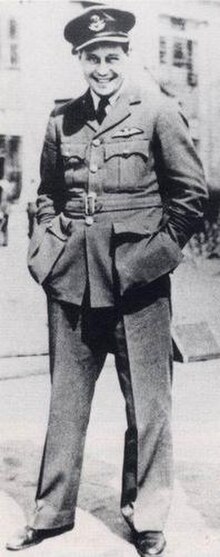Roger Bushell
| Roger Bushell | |
|---|---|

Bushell in his RAF uniform shortly before his capture
|
|
| Born |
30 August 1910 Springs, Transvaal, South Africa |
| Died | 29 March 1944 (aged 33) Ramstein, Germany |
| Allegiance |
|
| Service/branch | Royal Air Force |
| Years of service | 1932–1944 |
| Rank | Squadron Leader |
| Commands held | No. 92 Squadron RAF (1939-1940) |
| Battles/wars | World War II |
Squadron Leader Roger Joyce Bushell RAF (30 August 1910 – 29 March 1944) was an Auxiliary Air Force pilot who organised and led an escape from Stalag Luft III, a German prisoner of war camp. He was a victim of the Stalag Luft III murders. The escape was used as the basis for the film The Great Escape. The character played by Richard Attenborough, Roger Bartlett, is modelled on Roger Bushell.
Bushell was born in Springs, Transvaal, South Africa, on 30 August 1910 to English parents, Benjamin Daniel and Dorothy Wingate Bushell (née White). His father, a mining engineer, had emigrated to the country from Britain and he used his wealth to ensure that Roger received a first class education. He was first schooled in Johannesburg, then aged 14 went to Wellington College in Berkshire, England. In 1929, Bushell then went to Pembroke College, Cambridge, to study law.
Keen on pursuing non-academic interests from an early age, Bushell excelled in athletics and skied for Cambridge in races between 1930 and 1932, captaining the team in 1931.
One of Bushell's passions and talents was skiing: in the early 1930s he was declared the fastest Briton in the male downhill category. He even had a black run named after him in St. Moritz, Switzerland, in recognition of the fact that he had set the fastest time for the run. He also won the slalom event of the annual Oxford-Cambridge ski race in 1931.
...
Wikipedia
